

Mahabharatha and Trojan war - Greek influence on India. Pandavas were sent to forest for 14 years, similarly the Greek-Trojan conflict went on for nearly 14 years.
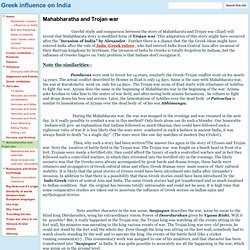
The actual conflict described by Homer in Iliad is only 14 days. Same is the case with Mahabharata war, the war at Kurukshetra went on only for 14 days. The Trojan war scene of Iliad starts with reluctance of Achilles to fight the war. Arjuna does the same in the beginning of Mahabharata war in the beginning of the war. Arjuna asks Krishna to take him to the centre of war field, and after seeing both armies formations , he refuses to fight and drops down his bow and arrows. During the Mahabharata war, the war was stopped in the evenings and was resumed in the next day. Then, why such a story had been written? Note another character in the war scene, Sanjayan describes the war, scene by scene to the blind king Dhridarashra, using his extraordinary vision.
Bhishma had taken the role of Hector, the righteous son of Priam, Duryodhana has taken the role of Paris. Mythology Guide - A dictionary of Greek and Roman Myths. THEOI GREEK MYTHOLOGY, Exploring Mythology & the Greek Gods in Classical Literature & Art. Odyssée. Scène de l’Odyssée, fresque romaine (fin du IIe siècle av.
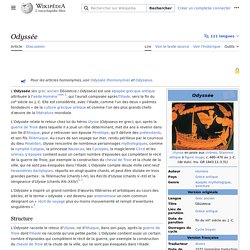
J. -C.) L’Odyssée (en grec ancien Ὀδύσσεια / Odýsseia) est une épopée grecque antique attribuée à l’aède Homère[note 1], qui l'aurait composée après l’Iliade, vers la fin du VIIIe siècle av. J. -C. L’Odyssée a inspiré un grand nombre d'œuvres littéraires et artistiques au cours des siècles, et le terme « odyssée » est devenu par antonomase un nom commun désignant un « récit de voyage plus ou moins mouvementé et rempli d'aventures singulières »[3]. Structure L’Odyssée raconte le retour d’Ulysse, roi d’Ithaque, dans son pays, après la guerre de Troie dont l’Iliade ne raconte qu'une petite partie. Invocation Le titre Odyssée (en grec ancien Ὀδυσσεία / Odysseía) est formé sur le nom grec d’Ulysse (Ὀδυσσεύς / Odysseús). Construction La construction du poème fait se succéder trois « moments » principaux : la Télémachie (chants I à IV) : Télémaque part demander des nouvelles de son père à Pylos et à Sparte, pour interroger Nestor et Ménélas. Interactive Greek Gods Family Tree.
Greco-Roman mysteries. See Western esotericism for modern "mystery religions" in the Western cultural sphere.
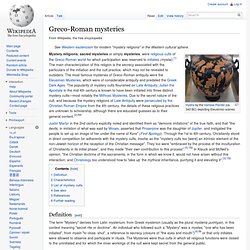
Definition[edit] The term "Mystery" derives from Latin mysterium, from Greek mysterion (usually as the plural mysteria μυστήρια), in this context meaning "secret rite or doctrine". An individual who followed such a "Mystery" was a mystes, "one who has been initiated", from myein "to close, shut", a reference to secrecy (closure of "the eyes and mouth")[4]:56 or that only initiates were allowed to observe and participate in rituals. The Mysteries were thus cults in which all religious functions were closed to the uninitiated and for which the inner workings of the cult were kept secret from the general public. Characteristics[edit] Mystery religions form one of three types of Hellenistic religion, the others being the imperial cult or ethnic religion particular to a nation or state, and the philosophic religions such as Neoplatonism. Mysteries thus supplement rather than compete with civil religion. Gaia (Greek Mythology)
The Greek word γαῖα (transliterated as gaia) is a collateral form of γῆ[4] (gē, Doric γᾶ ga and probably δᾶ da)[5] meaning Earth,[6] a word of uncertain origin.[7] R.
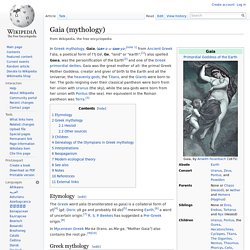
S. P. Beekes has suggested a Pre-Greek origin.[8] In Mycenean Greek Ma-ka (trans. as Ma-ga, "Mother Gaia") also contains the root ga-.[9][10] According to Hesiod, Gaia conceived further offspring with Uranus, first the giant one-eyed Cyclopes: Brontes ("Thunder"), Steropes ("Lightning") and Arges ("Bright");[16] then the Hecatonchires: Cottus, Briareos and Gyges, each with a hundred arms and fifty heads.[17] As each of the Cyclopes and Hecatonchires were born, Uranus hid them in a secret place within Gaia, causing her great pain. Because Cronus had learned from Gaia and Uranus, that he was destined to be overthrown by his own child, Cronus swallowed each of the children born to him by his Titan sister Rhea. With Gaia's advice[21] Zeus defeated the Titans. In classical art Gaia was represented in one of two ways. Pantheon.
Family tree of the Greek gods. Key: The essential Olympians' names are given in bold font.
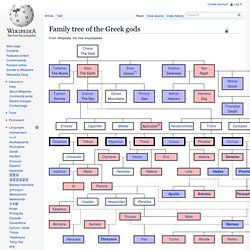
See also List of Greek mythological figures Notes External links Media related to Family trees of Greek mythology at Wikimedia Commons.